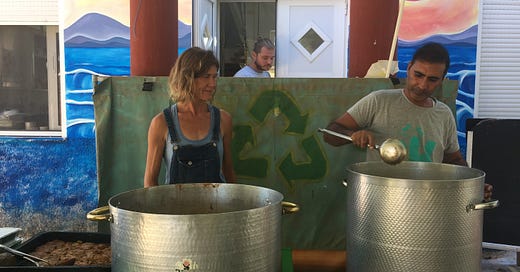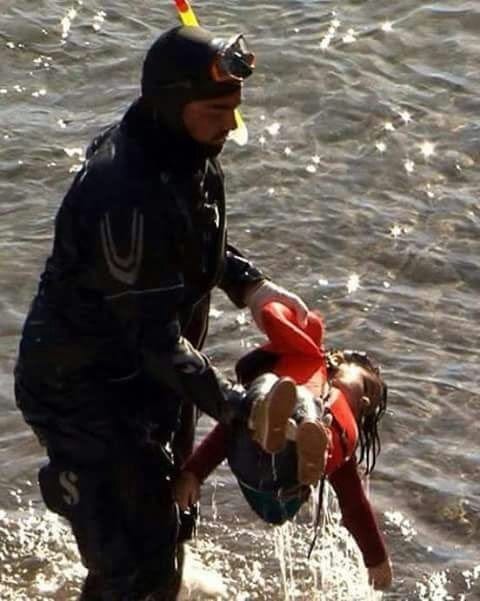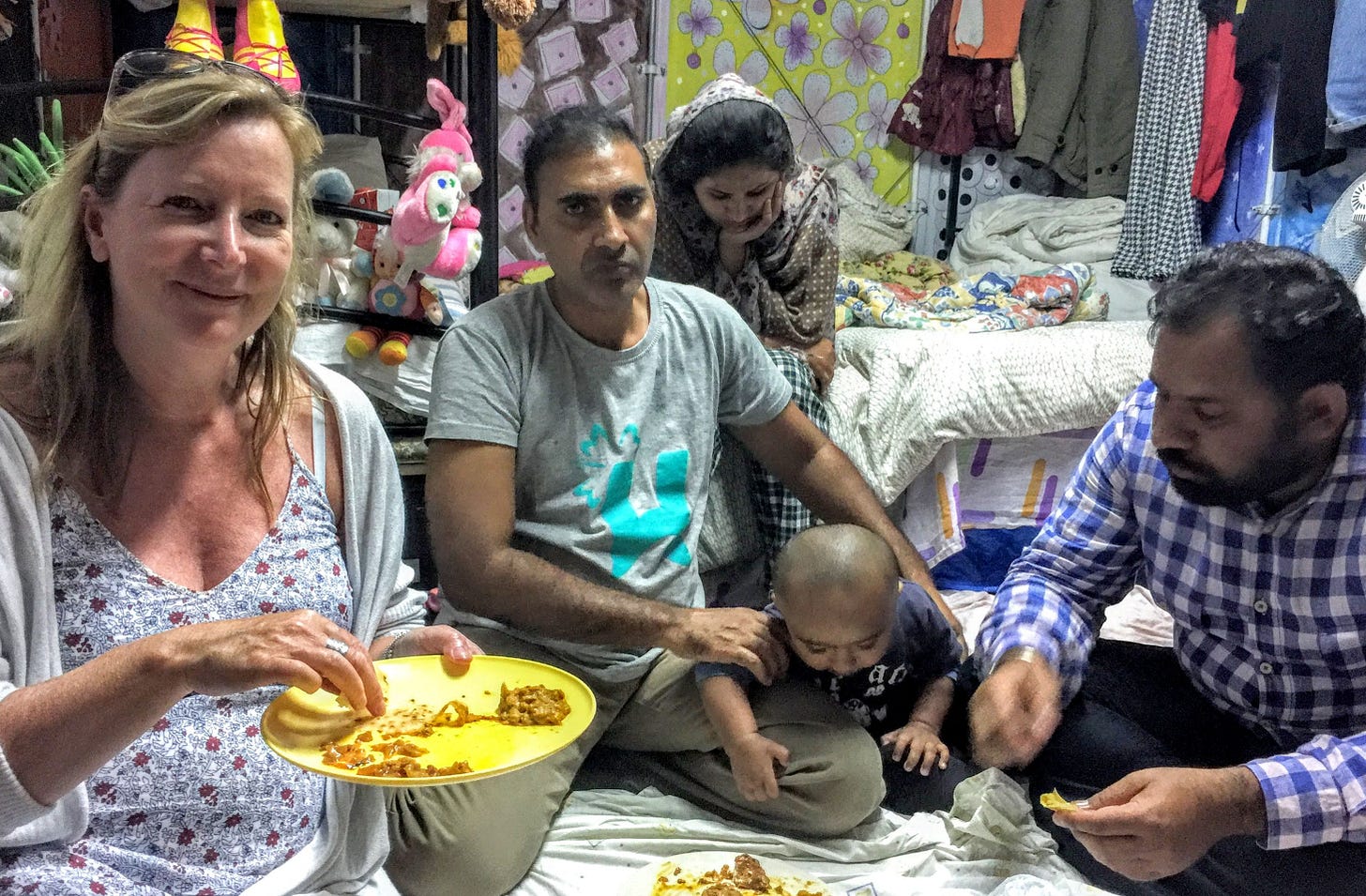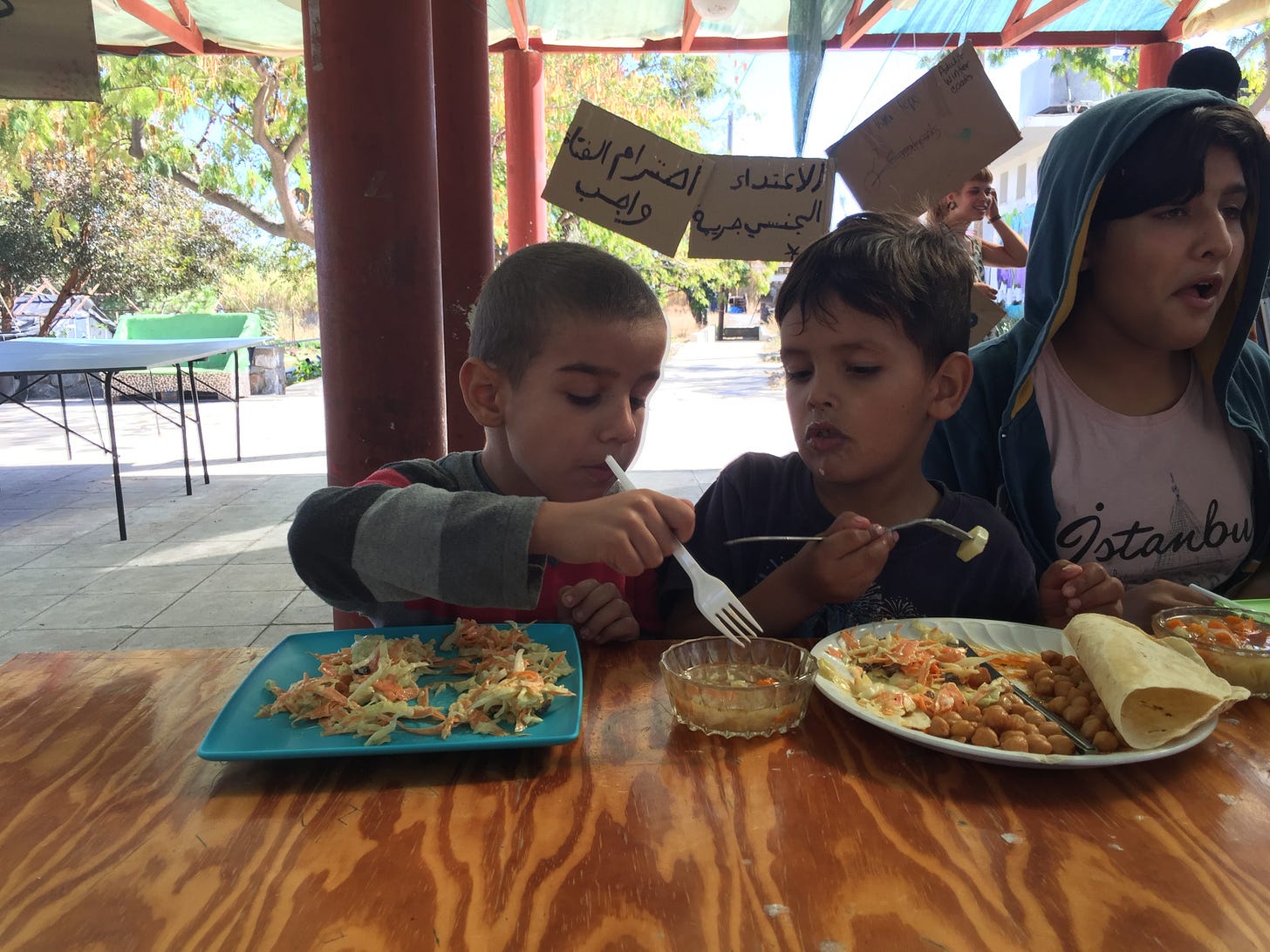Cooking in a Refugee Camp
Who can forget the picture of a toddler lying face down in the surf near Bodrum, Turkey?
Nine years ago, he was one of at least a dozen Syrian refugees who drowned trying to reach the Greek island of Kos. Thousands more were landing on the island of Lesbos – it had reached a “breaking point.”
When a friend working at an NGO asked if I’d volunteer at a refugee camp to cook and help set up a kitchen, I didn’t hesitate. I wanted to do something for the Syrian refugees coming to Vancouver, but I couldn’t offer accommodation or much money. It never occurred to me that I could help on Lesbos. I’m not a medical professional, translator, or house builder, but they knew I had plenty of experience cooking and catering as the owner/operator of Canada's largest film catering company. I organized one event that served 9,000 people.
My friend Vanessa volunteered to join me. I was relieved not to go alone — I had no idea what to expect or what was expected of me. We set up an online GoFundMe, and Air Canada waived my airfare and extra baggage fees, so I stuffed three suitcases with English 101 books, toys and art supplies donated by friends.
I arrived one year after that toddler drowned, after half a million refugees passed through Lesvos. However, even though a few boats continued to make the perilous journey, thousands of refugees were still in camps waiting for asylum.
We were volunteering at PIKPA, home to hundreds of the most vulnerable refugees. This Greek-run organization provides housing, food, legal and medical support to families, the elderly, pregnant women and people with disabilities, including depression and PTSD.
We also provided meals to the notorious Moria, which resembled a maximum-security prison from the outside—inside was even worse. More than 12,000 refugees were at this military-run registration camp for months without fresh water or electricity, their living quarters a plastic tarp. At night, it was dangerous, especially for women.
Cooking in a restaurant, you have the right equipment to serve hundreds of meals from a vast array of ingredients. Catering to the film industry, your vegetables are available peeled, sliced, or diced. It was a greater challenge here. The PIPKA kitchen has industrial-sized pots and pans that fit on ground-level propane burners but dinky plastic utensils to stir with.
Day 1
After registering at the PIKPA office, we peel 200 lbs of potatoes. Along with my chef knives, I should have packed a vegetable peeler — just about every tool in the kitchen is as dull as a butter knife. I’m already frustrated. Celina, a lovely Greek woman in charge of the kitchen, is bent over a sink removing guts and nasty bits from chickens. I volunteer to take over, and her eyes light up. There's no time to pluck stray feathers — lunch is in one hour, and I have to make a vegetarian entrée for most of the 30 volunteers.
Day 2
The only can opener mysteriously disappears, so Massoud, a volunteer, deftly opens a four-litre can of tomato paste with a knife. I’m tasked with making tomato sauce without tomatoes, just paste. But there are lots of onions and dried herbs. Six chickens are left over from yesterday, so I chuck them in a huge cauldron for soup tomorrow. After four hours of chopping and slicing and draining pasta from pots the size of oil drums in this sweltering kitchen, my back hurts and I’m exhausted.
Day 3
Celina takes a few days off and instructs me to place an order. Tomatoes and fruit are too expensive, no squash left, but maybe aubergine. Along with the soup, Shabir Iqbal, a Pakistani refugee and former engineer at Karachi airport, helps cook lentils and rice. I realize that my frustration is petty. All his family were killed by the Taliban, and a psychologist helps treat his depression every Friday. I think he wants to keep busy.
It’s even hotter today, and we must keep the door closed. Otherwise, things go missing like the can opener. The food distribution area is next door and families pick up supplies to cook rudimentary meals in their tents. Volunteers divide and distribute sacks of beans and rice into little plastic bags.
That evening, we take Iqbal, Sultan and Mraza, two other Pakistani men, to Myteline, the capital city of Lesvos. Iqbal wants to make a special lunch tomorrow, so we drive to the supermarket, and I buy a 15 kg bag of basmati rice, dozens of tomatoes and a bushel of parsley. Iqbal smiles; he wants to show off his cooking skills. It keeps his mind off the past, however briefly. Sultan, age 19, said they all had “sweet dreams of Europe,” but no longer do. Now they worry about getting deported back to Turkey. Back at the camp, Mraza invites us to his tent for dinner. His wife seems proud to have us as guests -- it’s heartbreaking. We sit on the ground, eating lentils and rice with our fingers
.
Day 4
Iqbal has been in the kitchen since 6 a.m. preparing hundreds of potato-tomato cakes. We toss the cakes in flour and then egg, but we have to fry them in Greek olive oil. I can’t get the pans hot enough, so I try to pat the grease off and chuck them in the oven, which is either blasting hot or off. They will be served at room temperature, along with carrot and raisin salad and Iqbal’s basmati.
Day 5
Celina is back, so I have some time to walk around the camp and come across a vegetable garden, hurray! But on closer inspection, the tomatoes have rotted on the vine, while the cucumbers and lettuce are way past their prime. I’m told that none of the refugees want to garden because it means they would have to stay here longer.
I ask Lena, one of PIPKA’s co-founders, if “voluntourism” is a problem, given that people like us often help for only a few weeks. “If you have something positive to contribute, you are welcome,” she says. “At one time, we had 60 volunteers and at lunch time they were popping up like mushrooms after the rain — I didn’t know where they all came from. Now we have teachers, a medical team, and a larger community. … I didn’t know there were so many beautiful people in the world









